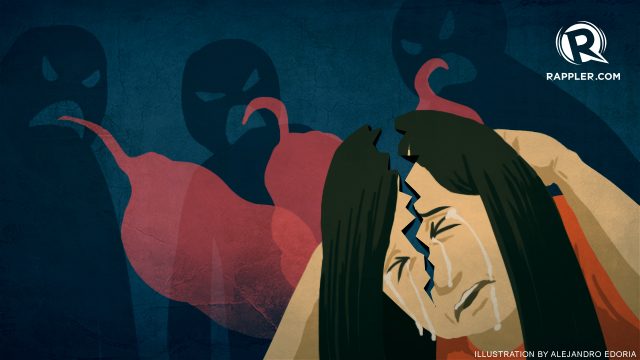SUMMARY
This is AI generated summarization, which may have errors. For context, always refer to the full article.

I was appalled by a post by a UP alumna Billie de la Paz, that went viral recently. In that post she details her application process for a student organization in the University of the Philippines in Diliman. The post talks about the physical verbal and psychological abuse she had to go through and the fact that years after, she is still suffering from post traumatic stress disorder.
I was appalled for many reasons, chief of which was that I would describe her experience as cruel, inhuman and degrading treatment, words that are closely associated with the word “torture.” I request the reader not to scream, “hyperbole! exaggeration!” For years, my work was listening to the stories of torture experienced in the jails of the Marcos dictatorship.
Looking at definitions, the UN convention is entitled, “Convention against Torture and Other Cruel, Inhuman or Degrading Treatment or Punishment.” Under the convention, torture has several elements which include that the pain and suffering is inflicted by persons in authority, particularly state parties, in order to obtain information or confession. This of course, is not the case of an applicant for membership to a student organization. The perpetrators were not government agents, nor were they seeking information or a confession.
However, other human rights instruments cover instances where non-state actors inflict the suffering and for arbitrary reasons: “The element that distinguishes inhuman treatment from torture is the absence of the requirement that the treatment be inflicted for a specific purpose. The International Criminal Tribunal for the former Yugoslavia has used a wider definition determining that inhuman treatment is that which “causes serious mental or physical suffering or injury or constitutes a serious attack on human dignity.”
Cruel, inhuman and degrading
So, indeed, one cannot technically call what was done “torture” but instead “cruel, inhuman or degrading treatment.” These two may be different conceptually but these are astoundingly similar in terms of the effect of the treatment. Anyone working in this area will tell you that the techniques for torture bear striking similarities, most especially in terms of their psychological processes and effects.
Let me be clearer: the description of the psychological abuse is similar to what the torture survivors I talked to were subjected to. Sure, there were no electrocutions, water-boardings, physical mutilations, rape, molestation and the like. But of course the organization members did not have the luxury of total control of the applicant and the venue as did the military torturers of martial law. Yet, without these, organizations like fraternities have managed to find ways of physical harm that have resulted in death.
Anyone, any UP student, who doubts this is welcome to come to my office for a longer and deeper discussion on torture and cruel inhuman and degrading punishment. But don’t take my word for it. It will all do us a tremendous amount of good in the light of the historical revisionism of the Marcos family to read the original accounts of the torture survivors. And while you read, please note of the similarities between Billie’s account and those of the Marcos victims.
I feel sick now writing the words “UP”, “UP students”, “student organizations”, “inhuman treatment” and “torture techniques” in one essay. It is things like these that make me despair for an institution to which I have devoted so much time and passion.
What surprised me is the denial of the organization that the rumor mills were naming as the one that had perpetuated the inhuman treatment, Samaskom. It surprised me because it was a confirmation of the rumor. What did not surprise me was the outright denial.

I believe in Billie
I am deeply sorry for Samaskom, but I believe Billie de la Paz. And if she has (or will) identify Samaskom, then I will weep with Billie and Samaskom and the whole of UP. In fact I am weeping now.
Because as I began to talk to others, alumni of Samaskom began to confirm bits and pieces of her story. “I did not experience that part but I did undergo that part…”
And oh, Samaskom, the only thing that might mitigate your situation was that over the past 2 weeks I have heard similar stories of other UP organizations with the same pattern of inhuman treatment of their applicants. It might mitigate your situation Samaskom, but the thought that yours is not an isolated case is breaking my heart.
One woman, for example, talked of her similar recruitment process with an environmental organization! She talked of how on the final day they were made to go to an isolated jungle area where they stumbled around blind-folded, were insulted and made to do exhausting physical work to the point where they were almost at mental breakdown. They were wet, thirsty, hungry and exhausted. She genuinely feared for a co-recruit who was obviously suffering from hypothermia.
Others talked of the same ridiculous processes of those signature sheets where they were also made to gather an impossible number of signatures in a short time period only to have the sheets torn up. This is of course a classic technique where one is made to do an impossible task that is also meaningless. And in case you have any illusion you may succeed, they will dash any such hopes, by tearing up your sheets. Having failed you are then subjected to more abuse – whether psychological or physical.
Dancing in demeaning situations seemed to be a common element of the stories – on a table in high heels while people kicked the table, in your underwear, to the taunts and curses of people. Sexual taunts, especially for women, was also a common theme. (Something also reminiscent of the stories of women torture victims who experienced sexual threats and denigration).
All of them talked of how the process became more and more degrading (so typical of many torture stories until the victim is either broken or is deemed unbreakable) and how similar the pattern had been: from acquaintance party, to formal interview, to costume week, to final rites and to recovery.
They talked about attempts to leave that were treated with good cop and bad cop routines. The good cop “somewhat” apologizing and blaming it on the bad cops and the bad cops threatening to make it even harder on those they would leave behind.
And all of them talked about how they found it unsettling to suddenly be treated like a dear friend by the people who had tormented them. (Stockholm syndrome, anyone?)
Like Billie they talked of moving away instead of being integrated into the organization. But they all felt shame (typical again of the torture experience) at what they had experienced. One woman even said, “I have never told anyone, not my friends nor my husband, nor my parents.”
Some tell of small resistance like refusing to participate in the recruitment process when they became members, thus putting to the lie the argument that, “all the members go through this, you should to.” Their answer was, “I refused to put anyone else through that so I refused to help in the next application process.”
Others talk of just moving away, as Billie did towards other groups who, thankfully, do not have these cruel practices.
I have asked myself difficult questions over this. Is student culture becoming like the culture of the military torturers where sadism is encouraged? Are we rewarding those who have followed their demons to win control of an increasing number of organizations while the good ones move away or remain silent? Are we encouraging organizations based on the idea that the individual needs to be broken down for the whole – very much the hallmark of cults and fascist organizations.
‘Truth commission’
As I listened to the stories of the decent ones who turned away, I realized that Billie has started something important. There is a need now to tell the stories and to make things right. And this includes those who participated, nay led, those inhuman rites. They must be held accountable, but they too have become victims of organizational systems that have caused the inhibition of their own kindness and justified instead systematic cruelty.
There have been practices that have dealt with systematic cruelty of this kind that has led to healing of the victims and forgiveness and healing for the perpetrators. I hope we as a community in UP might look at these and learn.
It starts with the setting up of a “truth commission” in UP with a “truth committee.” That committee should receive all testimonies of those who wish to tell their stories. Full confidentiality should be assured.
The committee should then come up with a report that must be fair and thorough. It can determine how widespread this problem is, how long this has been going on, which organizations and individuals are accountable.
For many of torture survivors such reports have proven sufficient for healing and they seek no longer to punish.
What such a report means for the perpetrators has always been up to the perpetrators. Individual and organizational acceptance of fault along with a heartfelt apology has often proven to be redemptive for perpetrators and their institutions. Often too, these remorseful ones have avoided any further persecution.
Regardless of individual actions, truth commission findings have helped to paved the way for strengthened human rights mechanisms. In the case of UP it can lead the way to a reformed culture for student organizations.
Like Bertrand Russell I believe that the two paramount values for a happy life are intelligence and kindness. Russell adds that these two virtues cannot exist without the other.
Student organizations must be given the atmosphere where they can vie for freely given and joyous commitment based on common principles. Not on some silly notion of inclusivity based on mutual suffering and self-aggrandizing mutual gain afterwards. Those dangerous and juvenile initiations are abominations. They must be stopped immediately.
All our systems in UP must be geared towards the development of the intellect and the capacity for kindness, including the recruitment processes of student organizations. That is how we prepare students to become happy and productive citizens in a democratic society. – Rappler.com
Add a comment
How does this make you feel?
There are no comments yet. Add your comment to start the conversation.